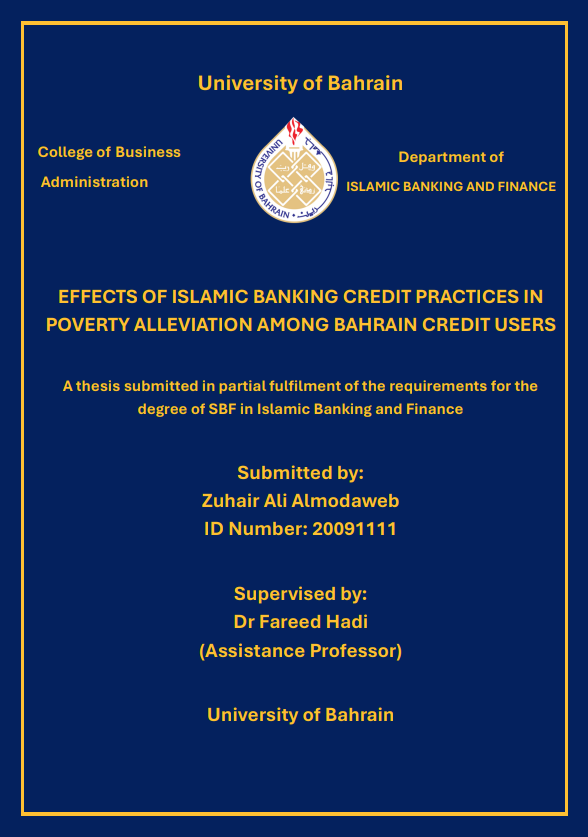Commitment of Bahrain Islamic Banks Towards Shari’ah Governance Practices (AAOIFI) and Relationship of Its Compliance with Financial Performance
Linked Agent
Hadi, Fareed, Thesis advisor
Date Issued
2021
Language
English
Extent
289 pages
Subject
Place of institution
Sakhir, Bahrain
Thesis Type
Thesis (Master)
Institution
UNIVERSITY OF BAHRAIN, COLLEGE OF BUSINESS ADMINISTRATION, DEPARTMENT OF ISLAMIC BANKING AND FINANCE, M.SC. IN ISLAMIC BANKING AND FINANCE GRADUATE STUDIES PROGRAM
Description
Abstract
The primary object of the research is to examine the extent of the commitment of Islamic banks towards AAOIFI Shari’ah governance practices in Islamic banks in Bahrain.
Firstly, this study explores perspectives of internal Shari’ah auditors and compliance officers towards the level of commitment of Islamic banks towards 7 AAOIFI governance standards.
Secondly, this study also evaluates the level of Islamic banks' compliance towards Shari’ah
governance standards of AAOIFI in Bahrain, using content analysis of annual reports.
Thirdly, the relationship between compliance to Shari’ah governance and financial performance is examined.
This research targeted employees working as internal Shari’ah auditors and compliance officers of Islamic retail and wholesale banks for the survey sample.
A detailed questionnaire using 5-point Likert scale was constructed to gather primary data. 33 employees from 13 Islamic banks participated in the survey using the purposive and snowball sampling technique.
Data is analyzed using SPSS. Content analysis approach is
used for extracting and analyzing secondary data on level of compliance as per disclosure practices of banks from their annual reports. Fourteen CBB licensed Islamic Banks were chosen as sample size and data for the period of 6 years (2015-2020) is collected.
Survey results show a high level of commitment (88% on average) of Islamic banks towards
Shari’ah governance practices. As per disclosure practices, it is found that the level of compliance with 7 AAOIFI governance standards is moderate, as the overall average compliance level is 69.8%, with the highest compliance achieved by Bahrain Islamic Bank and lowest by Citi Islamic Investment Bank. Regression results reveal a significant relationship between Compliance to Shari’ah governance and financial performance using both ROA and ROE. Whereas, size showed a significant and leverage no significant relationship with both ROA and ROE. Thus, this research recommends that AAOIFI and the regulator should identify the minimum level of Shari’ah governance practices that each bank should disclose in their annual reports. Furthermore, they should introduce strategies
to encourage individual Islamic banks to improve their commitment towards Shari’ah governance practices and thus set an example for other nations to follow.
Keywords: Shari’ah Governance, AAOIFI, Islamic Banks, Financial Performance.
The primary object of the research is to examine the extent of the commitment of Islamic banks towards AAOIFI Shari’ah governance practices in Islamic banks in Bahrain.
Firstly, this study explores perspectives of internal Shari’ah auditors and compliance officers towards the level of commitment of Islamic banks towards 7 AAOIFI governance standards.
Secondly, this study also evaluates the level of Islamic banks' compliance towards Shari’ah
governance standards of AAOIFI in Bahrain, using content analysis of annual reports.
Thirdly, the relationship between compliance to Shari’ah governance and financial performance is examined.
This research targeted employees working as internal Shari’ah auditors and compliance officers of Islamic retail and wholesale banks for the survey sample.
A detailed questionnaire using 5-point Likert scale was constructed to gather primary data. 33 employees from 13 Islamic banks participated in the survey using the purposive and snowball sampling technique.
Data is analyzed using SPSS. Content analysis approach is
used for extracting and analyzing secondary data on level of compliance as per disclosure practices of banks from their annual reports. Fourteen CBB licensed Islamic Banks were chosen as sample size and data for the period of 6 years (2015-2020) is collected.
Survey results show a high level of commitment (88% on average) of Islamic banks towards
Shari’ah governance practices. As per disclosure practices, it is found that the level of compliance with 7 AAOIFI governance standards is moderate, as the overall average compliance level is 69.8%, with the highest compliance achieved by Bahrain Islamic Bank and lowest by Citi Islamic Investment Bank. Regression results reveal a significant relationship between Compliance to Shari’ah governance and financial performance using both ROA and ROE. Whereas, size showed a significant and leverage no significant relationship with both ROA and ROE. Thus, this research recommends that AAOIFI and the regulator should identify the minimum level of Shari’ah governance practices that each bank should disclose in their annual reports. Furthermore, they should introduce strategies
to encourage individual Islamic banks to improve their commitment towards Shari’ah governance practices and thus set an example for other nations to follow.
Keywords: Shari’ah Governance, AAOIFI, Islamic Banks, Financial Performance.
Member of
Identifier
https://digitalrepository.uob.edu.bh/id/330c30a2-24bb-4dd8-9c51-cd2d33bdd251
Same Subject
